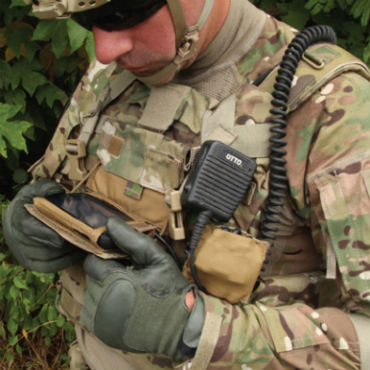Imitation is flattery: BlackBerry, Samsung emulate strategies to lure DOD clients
BlackBerry is still the incumbent in a sensitive market, but Samsung has invested in security to try to turn the tables.

Photo: PEO Soldier
BlackBerry and Samsung, incumbent and challenger for mobile-device clients at the Defense Department, are copying one another in a contest for a tightly guarded and sensitive market. BlackBerry is seeking to answer client concerns about application variety with thousands of new apps, while Samsung has invested heavily in security to try to carve out a share of the market.
BlackBerry has long been the dominant mobile vendor at the Pentagon. FCW reported in May 2013 that of the more than 600,000 mobile devices then in use at DOD, about 470,000 were BlackBerries, 41,000 were made by Apple, and 8,700 were Android devices.
But the Defense Department has run a wide range of non-Blackberry mobile pilot programs in recent years, and Samsung -- the leading vendor of smartphones running on the Android operating system -- has made a sustained effort to meet DOD's stringent security requirements. The electronics giant designed the Knox, a mobile-device platform released in February 2013, with a security feature that separates work and personal applications.
Johnny Overcast, director of government sales for Samsung Telecommunications America, said he has been talking "to everyone from the CIO on down" at DOD in an effort to encourage adoption of Samsung mobile products. He said the latest version of the Knox platform can make a difference because it provides "additional hardening of the device all the way from the hardware layer through the middleware operating system" and would thus help customers comply with "bring your own device" policies.
It took months of work with the Defense Information Systems Agency, which handles mobile security certifications for DOD, to win approval for a Security Technical Implementation Guide for the Knox in May 2013, Overcast said. STIG approval means operating systems can connect to DOD networks and is a prerequisite for mobile vendors to sell to defense agencies.
Overcast sees certification of the Knox as a potential step toward wider adoption of Samsung devices at DOD. But DISA's Approved Products List is chock full of vendors, and deployment and approval are two very different things.
"There's a lot of press about how the other vendors are going through the [approval] process," said Jeff Ait, BlackBerry's head of U.S. public sector, but "what is actually being deployed and rolled out has been [in] extremely small numbers."
Both Ait and Overcast declined to give data on how many of their mobile products various DOD agencies have deployed, preferring instead to offer a track record (in the case of BlackBerry) or future opportunities (in the case of Samsung) as a measure of which way the wind is blowing.
Overcast said "thousands" of servicemen are using the Knox right now, including those in the Army's Nett Warrior command. Meanwhile, DISA began deploying 20,000 BlackBerry devices in March, a BlackBerry representative told FCW recently. DOD's inspector general, the Defense Advanced Research Projects Agency, and the Defense Contract Management Agency are other Pentagon agencies using BlackBerry devices, according to the Canadian firm.
BlackBerry doubles down on government clients
BlackBerry's recent struggles with commercial sales might explain the firm's eagerness to shore up its base of government clients.
BlackBerry's share of the global smartphone market has dropped from roughly 14 percent in the first quarter of 2011 to 0.5 percent in the same quarter for 2014, according to the IDC, a market research firm.
BlackBerry faced pressure in the government space from other mobile vendors because competitors offered "the idea of an expansion of applications and a mixture of both personal and work on a single environment," Ait said. And so the firm announced in June a licensing agreement with the Amazon Appstore for more than 200,000 Android applications.
There was also general anxiety among customers about BlackBerry's future, Ait added. "Many people... went down that path a year ago or 18 months ago because, one, they were worried we were going out of business; two, they thought we were going to get sold to a Chinese company, which scares the bejesus" out of people.
But Ait is confident that BlackBerry's largest customer, DOD, will remain a reliable client for the foreseeable future. And what he described as a "very cumbersome" process for winning security certifications from DISA could favor the incumbent.
"I think one of the problems that the Department of Defense has right now, and they're trying very hard to improve on that, is the approval process is currently taking longer than the life cycle of an operating system or a device," Ait said.
DISA counters that the process is getting more efficient. In announcing STIG approval for the Samsung Knox and the BlackBerry 10, Playbook and Device Service, in May 2013, the agency said approval of the Samsung Knox STIG represented "a paradigm shift in DISA's business processes that dramatically increased the efficiency of bringing new devices into the DOD enterprise."
Nonetheless, judging by the experiences of Ait and Overcast, certification still requires a commitment in time and resources from companies -- a barrier to entry that is likely to affect how the DOD mobility market shakes out.





